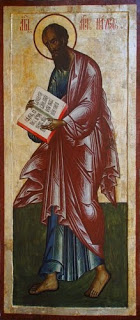
“Into the Wild” is a biographical sketch of the story of Christopher McCandless as written by Jon Krakauer.
In 1990, Christopher McCandless, a young man in his 20’s, set out on a cross-country journey to experience life in the wilderness. After 2 years on the road, McCandless crossed a stream in a remote area of Alaska and ended up living in an abandoned bus he came across. He stays there for a few months, but he soon tires of gathering his own food and of the harsh reality of living alone in the wild.
When McCandless seeks to return from the wild to his friends and family, he finds that the stream which he crossed in the snow has become wide, deep, and violent due to the thaw, thus making it impossible to cross. In the film, it seems as if time stands still. McCandless stops there, perfectly silent, staring at the wild river that has now made him a prisoner of his choices.
****
I’m reading through the book of Joshua now. I just finished up Romans and have been working on a post about Joshua 6 (that will come later), and as I backtracked a little for context, I was reminded of the powerful story of faith contained in the book of Joshua.
Right before beginning Joshua, I was listening to a podcast, where a Christian speaker emphasized that sometimes we need to step out. Thus, I looked up the story of Joshua crossing the Jordan in Joshua 3. A detail I never noticed before leapt out at me.
Now the Jordan is at flood stage all during harvest.
You likely know the end of this story. The priests, walking in obedience to God’s command, stepped out into the flood waters. They carried the Ark of the Covenant, a sign of God’s presence and His promises, with them. The water piled up in a heap beside them, and there the priests stood, in the middle of the river on dry ground, waiting until all of Israel was safely on the other side.
But let’s back up a minute for context. Imagine that you are in the shoes of the Israelites. The two spies had just returned from Jericho with a favorable report: “The LORD has surely given the whole land into our hands; all the people are melting in fear because of us.” There was likely much celebration. After 40 years of their ancestors wandering in the wilderness, the Israelites would finally see the promised land.
Then early the next morning, the Israelites were instructed to pack up their things and move their camp to the banks of the Jordan River. For 3 days, they camped near the river’s edge. Imagine the spray from the flooded river, the violent water vigorously lapping the banks. They must have been thinking through all the possibilities of how they would get across as they stared at the obstacle that stood between them and their dreams of a better life.
There may have been some who remembered crossing the Red Sea, or at least heard the story from their elders. Could God do that again?
At the end of the third day, Joshua commands them, “Consecrate yourselves, for tomorrow the LORD will do wonders among you.” The anticipation builds. The next morning, everyone awakes and prepares to move forward. The people are directed to follow the Ark of the Covenant at a distance, while the priests were commanded: “When you reach the edge of the Jordan’s waters, go and stand in the river.”
When the Red Sea parted, the waters had already parted prior to the Israelites stepping into the newly-created dry land. Why wasn’t God doing that again? Was He examining their hearts, as if to make sure they were really on board? The Israelites wandered in the wilderness because of their disobedience and hard hearts. Why was He requiring an extra act of faith on the part of the priests, that they should step directly into the flood waters they had been watching for 3 days? Was He in essence, saying, “This is it, guys. We’re almost there. Are you going to continue to choose to trust me and follow my commands?”
What is your Jordan?
What is the thing that is standing between you & your dreams, your freedom, the Promised Land that God is calling you to step into?
Are you standing on the banks of your Jordan, as Christopher McCandless did on that river’s edge in Alaska, overwhelmed by the cold spray on your face and the rushing waters at your feet? Are you staring at the river, your obstacle, positive that you, like him, are destined to be a prisoner of your past choices?
If you are a believer in and follower of Jesus Christ, you are no longer a prisoner of your past choices. The amazing thing about the God we serve is that He sets the captives free, He brings us from darkness into light. And if He is calling you to step out, He will make a way where there is no way.
Are you willing to trudge forward as the Israelites did, choosing to trust that God has gone ahead of you?
Do you need to just step out, trusting that God will make a way?


